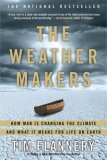Summary | Excerpt | Reviews | Beyond the Book | Readalikes | Genres & Themes | Author Bio
How Man Is Changing the Climate and What It Means for Life on Earth
by Tim Flannery

Critics' Opinion:
Readers' Opinion:
First Published:
Mar 2006, 352 pages
Paperback:
Jan 2001, 400 pages
 Book Reviewed by:
Book Reviewed by:
BookBrowse Review Team
Buy This Book
And many people have reacted with rightful caution to news about climate change. After all, we have in the past got things badly wrong.
In the 1972 publication The Limits to Growth, the Club of Rome told us the world was running out of resources and predicted catastrophe within decades. In an era of excessive consumption this imagined drought of raw materials gripped the public imagination, even though no one knew with any degree of certainty what volume of resources lay hidden in the earth. Subsequent geological exploration has revealed just how wide of the mark our estimates of mineral resources were back then, and even today no one can accurately predict the volume of oil, gold, and other materials beneath our feet.
The climate change issue is different. It results from air pollution, and the size of our atmosphere and the volume of pollutants that we are pouring into it are known with great precision. The debate now, and the story I want to explore here, concerns the impacts of some of those pollutants (known as greenhouse gases) on all life on Earth.
Is climate change a terrible threat or a beat-up? A bang or a whimper? Perhaps it’s something in between—an issue that humanity must eventually face, but not yet. The world’s media abound with evidence to support any of these views. Yet perusing that same media makes one thing clear: Climate change is difficult for people to evaluate dispassionately because it entails deep political and industrial implications, and because it arises from the core processes of our civilization’s success. This means that, as we seek to address this problem, winners and losers will be created. The stakes are high, and this has led to a proliferation of misleading stories as special interest groups argue their case.
What’s more, climate change is a breaking story. Just over thirty years ago the experts were at loggerheads about whether Earth was warming or cooling—unable to decide whether an icehouse or a greenhouse future was on the way. By 1975, however, the first sophisticated computer models were suggesting that a doubling of carbon dioxide (CO2) in the atmosphere would lead to an increase in global temperature of around five degrees Fahrenheit. Still, concern among both scientists and the community was not significant. There was even a period of optimism, when some researchers believed that extra CO2 in the atmosphere would fertilize the world’s croplands and produce a bonanza for farmers.
But by 1988 climate scientists had become sufficiently worried about CO2 to establish a panel, staffed with the world’s leading experts, to report twice each decade on the issue. Their third report, issued in 2001, sounded a note of sober alarm—yet many governments and industry leaders were slow to take an interest. Because concern about climate change is so new, and the issue is so multidisciplinary, there are few true experts in the field, and even fewer who can articulate what the problem might mean to the general public and what we should do about it.
For years I resisted the impulse to devote research time to climate change. I was busy with other things, and I wanted to wait and see, hoping an issue so big would sort itself out. Perhaps it would be centuries before we would need to think intensively about it. But by 2001, articles in scientific journals indicated that the world’s alpine environments were under severe threat. As I read them, I remembered those rotting tree fern trunks in Mt. Albert Edward’s forest, and I knew that I had to learn more. This meant teaching myself about greenhouse gases, the structure of our atmosphere, and how the industrialized world powers its engines of growth.
For the last 10,000 years, Earth’s thermostat has been set to an average surface temperature of around 57°F. On the whole, this has suited our species splendidly, and we have been able to organize ourselves in a most impressive manner—planting crops, domesticating animals, and building cities. Finally, over the past century, we have created a truly global civilization. Given that in all of Earth history the only other creatures able to organize themselves on a similar scale are ants, bees, and termites—which are tiny in comparison and have concomitantly small resource requirements—this is quite an achievement.
Copyright © 2005 by Tim Flannery. Reprinted with permission from Grove Atlantic, Inc. All rights reserved.





The Funeral Cryer by Wenyan Lu
Debut novelist Wenyan Lu brings us this witty yet profound story about one woman's midlife reawakening in contemporary rural China.
Your guide toexceptional books
BookBrowse seeks out and recommends the best in contemporary fiction and nonfiction—books that not only engage and entertain but also deepen our understanding of ourselves and the world around us.